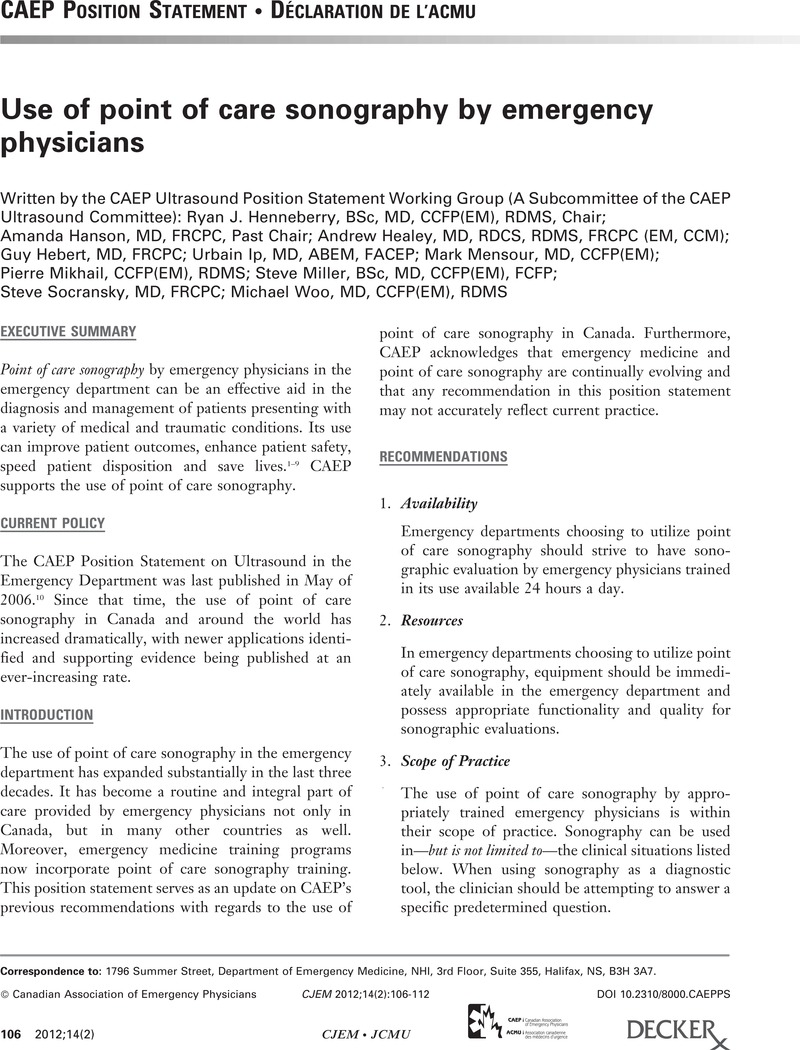Crossref Citations
This article has been cited by the following publications. This list is generated based on data provided by Crossref.
Heinrichs, Jeffrey
Fritze, Zachary
Vandermeer, Ben
Klassen, Terry
and
Curtis, Sarah
2013.
Ultrasonographically Guided Peripheral Intravenous Cannulation of Children and Adults: A Systematic Review and Meta-analysis.
Annals of Emergency Medicine,
Vol. 61,
Issue. 4,
p.
444.
Atkinson, Paul
Ross, Peter
and
Henneberry, Ryan
2014.
Coming of age: emergency point of care ultrasonography in Canada.
CJEM,
Vol. 16,
Issue. 04,
p.
265.
Woo, Michael Y.
Frank, Jason R.
and
Lee, A. Curtis
2014.
Point-of-care ultrasonography adoption in Canada: using diffusion theory and the Evaluation Tool for Ultrasound skills Development and Education (ETUDE).
CJEM,
Vol. 16,
Issue. 05,
p.
345.
Atkinson, Paul
2014.
L’arrivée de l’échographie pratiquée au point de service, plus précisément au service des urgences, au Canada.
CJEM,
Vol. 16,
Issue. 04,
p.
269.
Hayward, Melissa
Chan, Teresa
and
Healey, Andrew
2015.
Dedicated time for deliberate practice: one emergency medicine program’s approach to point-of-care ultrasound (PoCUS) training.
CJEM,
Vol. 17,
Issue. 5,
p.
558.
Farion, Ken J.
Wright, Megan
Zemek, Roger
Neto, Gina
Karwowska, Anna
Tse, Sandra
Reid, Sarah
Jabbour, Mona
Poirier, Stephanie
Moreau, Katherine A.
Barrowman, Nicholas
and
Eckle, Tobias
2015.
Understanding Low-Acuity Visits to the Pediatric Emergency Department.
PLOS ONE,
Vol. 10,
Issue. 6,
p.
e0128927.
Kondrashov, Peter
Johnson, Jane C.
Boehm, Karl
Rice, Daris
and
Kondrashova, Tatyana
2015.
Impact of the clinical ultrasound elective course on retention of anatomical knowledge by second‐year medical students in preparation for board exams.
Clinical Anatomy,
Vol. 28,
Issue. 2,
p.
156.
Léger, Pierre
Fleet, Richard
Giguère, Julie Maltais-
Plant, Jeff
Piette, Éric
Légaré, France
and
Poitras, Julien
2015.
A majority of rural emergency departments in the province of Quebec use point-of-care ultrasound: a cross-sectional survey.
BMC Emergency Medicine,
Vol. 15,
Issue. 1,
Atkinson, Paul
Bowra, Justin
Lambert, Mike
Lamprecht, Hein
Noble, Vicki
and
Jarman, Bob
2015.
International Federation for Emergency Medicine Point of Care Ultrasound Curriculum.
CJEM,
Vol. 17,
Issue. 2,
p.
161.
Moskowitz, Peter S.
2015.
Gathering Storm Clouds Suggest the Need for a Culture Change in Radiology: Radiologist-centered Imaging.
Radiology,
Vol. 276,
Issue. 1,
p.
3.
Rosenfield, Daniel
Kwan, Charisse
and
Fischer, Jason
2015.
Point-of-care ultrasound: An emerging technology in Canadian paediatrics.
Paediatrics & Child Health,
Vol. 20,
Issue. 2,
p.
67.
Ramsingh, Davinder
Rinehart, Joseph
Kain, Zeev
Strom, Suzanne
Canales, Cecilia
Alexander, Brenton
Capatina, Adriana
Ma, Michael
Le, Khanh-Van
and
Cannesson, Maxime
2015.
Impact Assessment of Perioperative Point-of-Care Ultrasound Training on Anesthesiology Residents.
Anesthesiology,
Vol. 123,
Issue. 3,
p.
670.
Micks, Taft
Sue, Kyle
and
Rogers, Peter
2016.
Barriers to point-of-care ultrasound use in rural emergency departments.
CJEM,
Vol. 18,
Issue. 6,
p.
475.
Olszynski, Paul A.
Harris, Tim
Renihan, Patrick
D’Eon, Marcel
and
Premkumar, Kalyani
2016.
Ultrasound during Critical Care Simulation: A Randomized Crossover Study.
CJEM,
Vol. 18,
Issue. 3,
p.
183.
Hoeffe, Julia
Desjardins, Marie Pier
Fischer, Jason
Carriere, Benoit
and
Gravel, Jocelyn
2016.
Emergency point-of-care ultrasound in Canadian pediatric emergency fellowship programs: current integration and future directions.
CJEM,
Vol. 18,
Issue. 6,
p.
469.
McKenna, Paul
Thoma, Brent
Milne, Ken
and
Bond, Chris
2017.
SGEM Hot Off the Press: ultrasound during critical care simulation: a randomized crossover study.
CJEM,
Vol. 19,
Issue. 1,
p.
50.
Chenkin, Jordan
and
Atzema, Clare L.
2018.
Contemporary Application of Point-of-Care Echocardiography in the Emergency Department.
Canadian Journal of Cardiology,
Vol. 34,
Issue. 2,
p.
109.
Olszynski, Paul
Kim, Dan
Chenkin, Jordan
and
Rang, Louise
2018.
The core emergency ultrasound curriculum project: A report from the Curriculum Working Group of the CAEP Emergency Ultrasound Committee.
CJEM,
Vol. 20,
Issue. 2,
p.
176.
Johri, Amer M.
Durbin, Joshua
Newbigging, Joseph
Tanzola, Robert
Chow, Ryan
De, Sabe
and
Tam, James
2018.
Cardiac Point-of-Care Ultrasound: State-of-the-Art in Medical School Education.
Journal of the American Society of Echocardiography,
Vol. 31,
Issue. 7,
p.
749.
Olszynski, Paul
Kim, Daniel J.
Chenkin, Jordan
and
Rang, Louise
2018.
The CAEP Emergency Ultrasound Curriculum – Objectives and Recommendations for Implementation in Postgraduate Training: Executive Summary.
CJEM,
Vol. 20,
Issue. 5,
p.
736.



